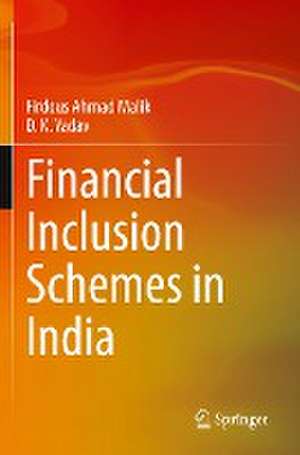Financial Inclusion Schemes in India
Autor Firdous Ahmad Malik, D. K. Yadaven Limba Engleză Paperback – 8 mai 2023
The exclusion of the destitute population from the formal financial system is a long-standing problem in India. This book examines the performance of financial inclusion policies in India to understand their impact on two urban vulnerable groups, Slum Dwellers and Beggars. This study includes analysis at the national level, the variables of the financial inclusion index like Penetration, Availability, and Usage from 2006 to 2020 from the world bank data set. Similarly, the authors examine five policies on financial inclusion by conducting a primary level survey on two urban capital cities of Lucknow and Kolkata, using a well-structured questionnaire for data collection. The authors uses two sampling techniques: simple random in the case of beggars, and stratified random in the case of slum dwellers.
This book highlights the difference between financial access and non-access of household respondents in capturing the impacts of financial inclusion schemes on their socio-economic condition and financial behavior. The findings indicate that access to these schemes is extremely limited for the underprivileged population, such as beggars and slum dwellers. The analysis has shown that claims made by the government are not based on real-life occurrences. This book demonstrates that these programs have a negligible effect on life-deprived people.
This book will be of interest to academia, policymakers, and society at large.
| Toate formatele și edițiile | Preț | Express |
|---|---|---|
| Paperback (1) | 572.62 lei 38-44 zile | |
| Springer Nature Singapore – 8 mai 2023 | 572.62 lei 38-44 zile | |
| Hardback (1) | 699.77 lei 3-5 săpt. | |
| Springer Nature Singapore – 7 mai 2022 | 699.77 lei 3-5 săpt. |
Preț: 572.62 lei
Preț vechi: 753.45 lei
-24% Nou
Puncte Express: 859
Preț estimativ în valută:
109.59€ • 113.21$ • 91.20£
109.59€ • 113.21$ • 91.20£
Carte tipărită la comandă
Livrare economică 21-27 martie
Preluare comenzi: 021 569.72.76
Specificații
ISBN-13: 9789811913181
ISBN-10: 9811913188
Pagini: 164
Ilustrații: XXV, 164 p. 1 illus.
Dimensiuni: 155 x 235 mm
Ediția:1st ed. 2022
Editura: Springer Nature Singapore
Colecția Springer
Locul publicării:Singapore, Singapore
ISBN-10: 9811913188
Pagini: 164
Ilustrații: XXV, 164 p. 1 illus.
Dimensiuni: 155 x 235 mm
Ediția:1st ed. 2022
Editura: Springer Nature Singapore
Colecția Springer
Locul publicării:Singapore, Singapore
Cuprins
Chapter 1: Introduction.- Chapter 2: Financial Theories and Their Relevance in Financial Inclusion.- Chapter 3: Impact of Recent Financial Inclusion Schemes on Status of Financial inclusion in India: Secondary Data Analysis.- Chapter 4 Socio-Economic Conditions and Pattern of Access and Non-Access in Recent Financial Inclusion Schemes of the Poorest of Poor.- Chapter 5: Financial Inclusion Schemes and Changing Socio Economic Status of Poorest of The Poor.- Chapter 6: Impact of Recent Financial Inclusion Schemes on Economic and Financial Behaviour of Poorest of the Poor.- Chapter 7 Conclusions, Findings and Recommendation.- Bibliography.- Appendixes.
Notă biografică
Firdous Ahmad Malik is a Senior Research Associate at Jindal Center for Global South O.P. Jindal Global University, Sonipat, India. He has published papers in Springer, Elsevier, Taylor Francis and other Scopus indexed journals. His research focuses on financial behaviour of the poorest of the poor, financial inclusion, and financial literacy; specializing in Microfinance, Development Economics, Urban-Rural Poverty, Monetary Economics, Public Finance and Inclusive Education.
D. K. Yadav is an Assistant Professor at the Department of Economics, Babasaheb Bhimrao Ambedkar University Lucknow, India. He has published papers in Springer, Elsevier, and other Scopus indexed journals. He has 12 years of teaching experience in Economics (Money and banking, public finance and econometrics). His research focuses on Econometric Theory, Applied Econometrics: Policy Evaluation in Microfinance, poverty and informal economy, Money and Banking and Financial Institutions, Monetary Economics, and Public Finance.
Textul de pe ultima copertă
The exclusion of the destitute population from the formal financial system is a long-standing problem in India. This book examines the performance of financial inclusion policies in India to understand their impact on two urban vulnerable groups, Slum Dwellers and Beggars. This study includes analysis at the national level, the variables of the financial inclusion index like Penetration, Availability, and Usage from 2006 to 2020 from the world bank data set. Similarly, the authors examine five policies on financial inclusion by conducting a primary level survey on two urban capital cities of Lucknow and Kolkata, using a well-structured questionnaire for data collection. The authors uses two sampling techniques: simple random in the case of beggars, and stratified random in the case of slum dwellers.
This book highlights the difference between financial access and non-access of household respondents in capturing the impacts of financial inclusion schemes on their socio-economic condition and financial behavior. The findings indicate that access to these schemes is extremely limited for the underprivileged population, such as beggars and slum dwellers. The analysis has shown that claims made by the government are not based on real-life occurrences. This book demonstrates that these programs have a negligible effect on life-deprived people.
This book will be of interest to academia, policymakers, and society at large.
Caracteristici
Explores poverty themes in India through financial schemes introduced by the Government of India Examines financial inclusion uniquely and explicitly Suitable for professional, policy makers, economists and finance readers
